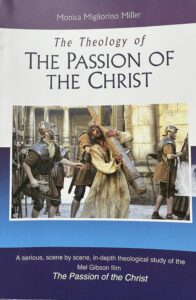 It’s been 20 years since the film was released, but only now I read The Theology of The Passion of the Christ, by Monica Migliorino Miller. Subtitled, “A serious, scene by scene, in-depth theological study of the Mel Gibson film The Passion of the Christ,” the book does not disappoint. If as I did you read it and then watch the film, you will notice and understand more than you did the last time you watched it.
It’s been 20 years since the film was released, but only now I read The Theology of The Passion of the Christ, by Monica Migliorino Miller. Subtitled, “A serious, scene by scene, in-depth theological study of the Mel Gibson film The Passion of the Christ,” the book does not disappoint. If as I did you read it and then watch the film, you will notice and understand more than you did the last time you watched it.
The theological and critical perspectives on the film are all over the map; the author includes positive and negative commentary from Catholics, Jews, Evangelicals, Protestants, Muslims, Buddhists, atheists, and others who fit no particular description. Fascinating as these perspectives are, I found the anecdotal comments from everyday viewers among the most penetrating and uplifting. How many movies could inspire hardened criminals to confess their crimes or abused children to forgive their abusive fathers?
It is impossible to watch The Passion of the Christ and not have a strong, deep, and long-lasting reaction.
It has been several years since I watched it. This time around I noticed how much things have changed since the time of Christ, and how much they have stayed the same.
 Jesus, now as then, is able to inspire great love and great hatred. The Jewish leaders who hated Jesus saw him, to put it in our terms, as being too “liberal,” too much of a threat to the established order. He consorts with sinners, He works on the Sabbath, He accuses the Pharisees of hypocrisy and spiritual corruption.
Jesus, now as then, is able to inspire great love and great hatred. The Jewish leaders who hated Jesus saw him, to put it in our terms, as being too “liberal,” too much of a threat to the established order. He consorts with sinners, He works on the Sabbath, He accuses the Pharisees of hypocrisy and spiritual corruption.
Today, many hate Jesus because He is too “conservative.” He forgives sinners and calls on them to repent, but this isn’t good enough: He must endorse their sin as well. He teaches us to deny rather than indulge ourselves, to give away rather than store up material treasures, to follow the one Truth rather than make up our own truths.
Jesus is at the center of all that is good, all that is true, and all that is beautiful. The nearer we are to Him, the more we are filled by His goodness, truth, and beauty. But when we move away from him in any direction, we move toward what is bad, what is false, and what is ugly. It doesn’t matter which direction we go.
God allows some people to move very close to Jesus without having any Christian theological knowledge at all, or even any knowledge of the Christian faith. And there are others who know Christian theology inside out who are completely cut off from His light.
And it is not just people, but entire cultures, that can move closer or farther from the light. You can learn the truth of that from a cursory reading of the Old Testament or any just about any book of history you pick up.
The question is always the same: In which direction am I moving?
